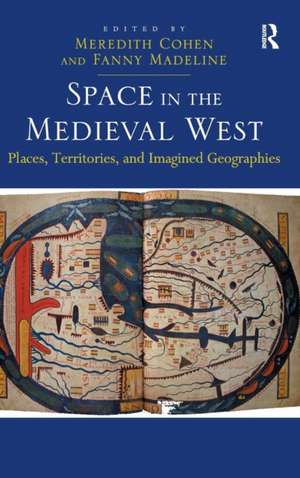Space in the Medieval West: Places, Territories, and Imagined Geographies
Autor Fanny Madeline Editat de Meredith Cohenen Limba Engleză Hardback – 2 iul 2014
| Toate formatele și edițiile | Preț | Express |
|---|---|---|
| Paperback (1) | 255.84 lei 6-8 săpt. | |
| Taylor & Francis – 30 iun 2020 | 255.84 lei 6-8 săpt. | |
| Hardback (1) | 1006.60 lei 6-8 săpt. | |
| Taylor & Francis – 2 iul 2014 | 1006.60 lei 6-8 săpt. |
Preț: 1006.60 lei
Preț vechi: 1227.57 lei
-18% Nou
Puncte Express: 1510
Preț estimativ în valută:
192.61€ • 200.62$ • 160.57£
192.61€ • 200.62$ • 160.57£
Carte tipărită la comandă
Livrare economică 28 martie-11 aprilie
Preluare comenzi: 021 569.72.76
Specificații
ISBN-13: 9781409453017
ISBN-10: 1409453014
Pagini: 266
Ilustrații: Includes 17 b&w illustrations and 15 maps
Dimensiuni: 156 x 234 x 16 mm
Greutate: 0.64 kg
Ediția:New ed.
Editura: Taylor & Francis
Colecția Routledge
Locul publicării:Oxford, United Kingdom
ISBN-10: 1409453014
Pagini: 266
Ilustrații: Includes 17 b&w illustrations and 15 maps
Dimensiuni: 156 x 234 x 16 mm
Greutate: 0.64 kg
Ediția:New ed.
Editura: Taylor & Francis
Colecția Routledge
Locul publicării:Oxford, United Kingdom
Cuprins
Space in the Medieval West
Notă biografică
Meredith Cohen is an Assistant Professor of Art History at the University of California, Los Angeles (UCLA). She is a founder of the International Medieval Society of Paris and served as President from 2003-2013. Her research focuses on medieval architecture and urbanism in the Gothic period, particularly in France. Fanny Madeline obtained her Ph.D. in medieval history from the Université de Paris 1 - Panthéon Sorbonne in 2009 after completing a thesis on the building policy of the Angevin Kings of England. She is currently a member of the editorial board for the journal Medievales, and is the Paris Director for the International Medieval Society of Paris.
Recenzii
'This project will be a great asset for libraries as a reference book. The individual essays will serve well for both further research projects and as documents to strengthen preexisting arguments since it is published by a well-known press, with chapters by both established and up-and-coming scholars, and supported by very reputable French and American institutions. If you are interested in the many facets of medieval constructions of space and modem understandings of them, make room on your plate for Space in the Middle West.' Hortulus ’...offer[s] stimulating perspectives on the potential of work on space to resonate beyond disciplinary boundaries. For scholars currently working on space, or indeed graduate students requiring a quick overview of the critical field, the introduction will be especially profitable and the footnotes even more so. Cohen and Madeline have produced a valuable and refreshing new collection that amply displays the range and depth of work currently undertaken on space, place, and imagined geographies in the humanities.’ Urban History 'Space in the Medieval West, a valuable anthology of essays on the broad theme of space as it was constructed, perceived, practiced, and mapped in the Middle Ages ...' Speculum 'For scholars currently working on space, or indeed graduate students requiring a quick overview of the critical field, the introduction will be especially profitable and the footnotes even more so. Cohen and Madeline have produced a valuable and refreshing new collection that amply displays the range and depth of work currently undertaken on space, place, and imagined geographies in the humanities.' Urban History ’...Space in the Medieval West serves to substantiate and complement existing studies whilst offering a number of fascinating new explorations into the iterative and contingent nature of space in the Middle Ages. For those close to the field of spatial studies, this essay collection will no doubt prove a thought-prov
Descriere
In the last two decades, research on spatial paradigms and practices has gained momentum across disciplines and periods, including the field of medieval studies. Responding to this ’spatial turn’ in the humanities, the essays collected here generate new ideas about how medieval space was defined, constructed, and practiced in Europe, particularly in France. The resulting collection builds on existing scholarship but brings new insight, situating medieval constructions of space in relation to contemporary conceptions of the subject.














